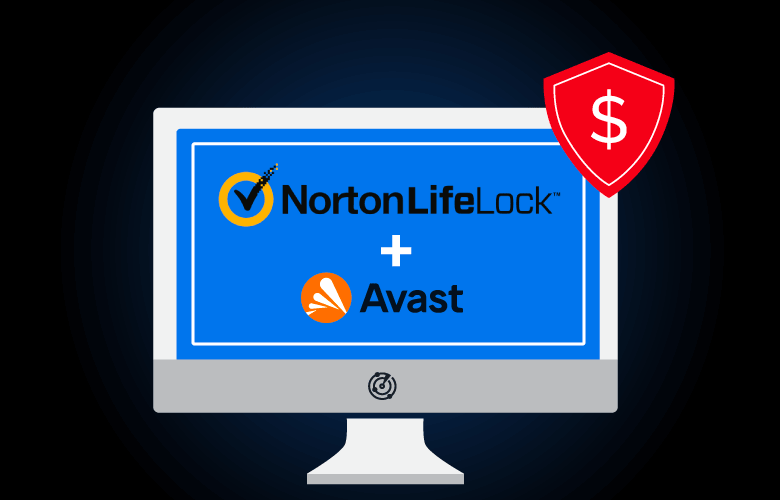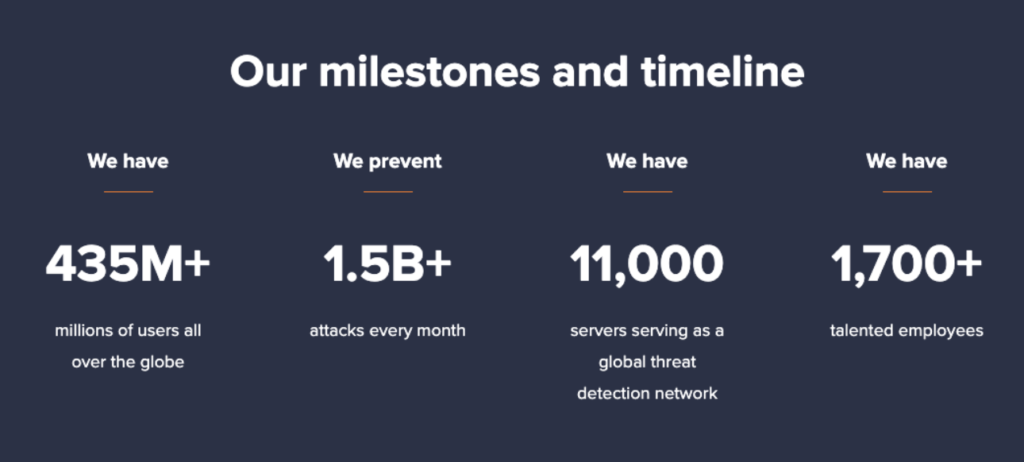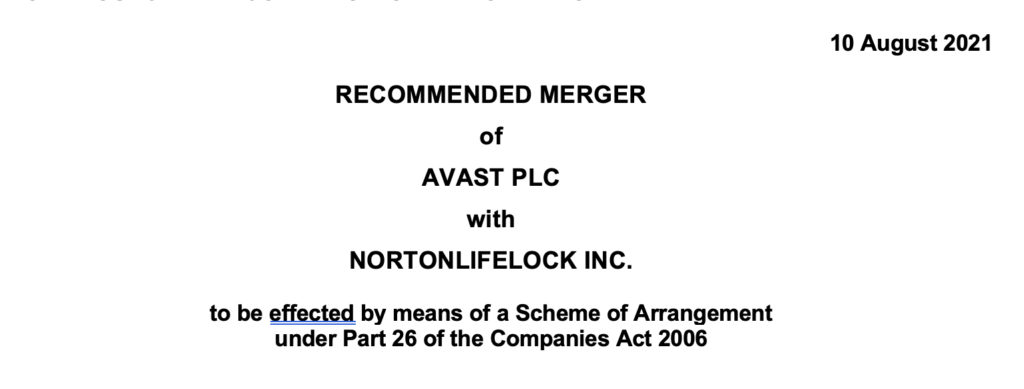September 17, 2021
Kape Technologies Buys ExpressVPN: What to Know
ExpressVPN is one of the more popular VPN providers on the market, which gives some explanation as [...]

WHAT’S IN THIS REVIEW?
Disclaimer: Partnerships & affiliate links help us create better content. Learn how.
NortonLifeLock and Avast are merging in a deal worth more than $8 billion, the third-largest cybersecurity acquisition of all time. What does this mean for the cybersecurity sector exactly?
Norton claims that this deal “represents an attractive opportunity to create a new, industry-leading consumer Cyber Safety business, leveraging the established brands, technology and innovation of both groups to deliver substantial benefits to consumers, shareholders, and other stakeholders.”
For all of the marketing spiel, will the move be positive, and what are their plans for the future?
Here’s our take on the merger, and why it’s big news for anyone using either Norton or Avast products to enhance their online security.
Norton and Avast are well-established security companies that anyone who’s used the internet in the last couple of decades should know about. Both are focused on cybersecurity – offering apps, products, and services for users who want to protect their devices while they’re online.
The two would-be rivals from the past now have the opportunity to maximize their customer base and offerings. In particular, the move will allow Norton to tap into the consumer software market.
Norton has been around in some shape or form for the past 39 years. Originally, this cybersecurity company was called Symantec. The company was renamed NortonLifeLock in 2019 following the sale of the Symantec software division to Broadcom Inc. in a $10.7 billion deal.
Based in the United States, they recorded revenues of $2.49 billion in 2020. They’re best known for developing antivirus and security software. They have over 80 million total users in more than 150 countries, including 23 million direct customers.
Despite their popularity, Norton has been at the center of a range of controversies over the years, such as taking renewal fees almost a month before subscriptions run out and making their antivirus software especially difficult to get rid of. They also offer a mid-tier VPN solution called Norton Secure VPN. This can be purchased as a standalone service or bundled with other Norton products at a discounted price.

Founded in 1988, Avast is a Czech multinational cybersecurity software company responsible for VPN software and an antivirus app. They have a user base of more than 435 million people worldwide and focus on protecting users’ digital data, identity, and privacy. On average, Avast blocked over 1.5 billion attacks and protected over 200 million new files each month in 2020.
Like Norton, they’ve had growing pains – admitting to sharing de-identified personal user information collected from devices with a subsidiary called Jumpshot in 2020. Avast is one of the larger European cyber protection companies, with a range of additional services under its umbrella. Notably, they also own a number of competing VPN providers.
The majority of their consumer security software options are sold using a freemium model. This explains how they’ve managed to gain such a large number of users. Basic features tend to be free to use, despite having to deal with ads on unpaid versions of their software.

The merger between Norton and Avast was announced on August 10, 2021. To coincide with the news, NortonLifeLock CEO Vincent Pilette issued the following statement:
“This transaction is a huge step forward for consumer Cyber Safety and will ultimately enable us to achieve our vision to protect and empower people to live their digital lives safely. With this combination, we can strengthen our Cyber Safety platform and make it available to more than 500 million users. We will also have the ability to further accelerate innovation to transform Cyber Safety.”
Their pooled resources are likely to be helpful to this end, especially as they’re two of the bigger names in the cybersecurity sector.
In terms of revenues, US-based Norton is much larger. However, now they have access to over 500 million combined users, the majority of which stem from Avast’s freemium business model. Pilette will remain in his role as CEO, while Avast CEO Ondrej Vlcek has been given the chance to join the board. The business will be dual headquartered in Prague and Tempe, Arizona.
The deal isn’t expected to be finalized until mid-2022, and they have yet to choose a new name.

Norton and Avast are the first to admit that they’re hoping to build on their considerable market share. In fact, double-digit growth and long-term potential are the main ticket items on their agenda.
Avast’s freemium model has proven to pay dividends. More so, its massive user base will likely be receptive to being introduced to new online security solutions. Meanwhile, it’s a valuable entry-point for both companies that will be able to expand on their already considerable US/EU market share. They hope to maximize revenue together at a time when cybersecurity is on the agenda for both consumers and businesses.
However, this does lead to a number of questions regarding monopolization. Moreover, it has the potential to change the cybersec landscape for users in Europe.
At first glance, it seems like another deal between two large companies who have decided to take as much of the pie as possible. It’s not uncommon in the cybersecurity sector. However, it does mean that they’re going to be able to reach a larger user base. And overall, they’ll have a more substantial impact on the online security sector as a whole.
Ideally, large corporations wouldn’t have so much of an influence in the sector, but it’s hard to argue with their projected user numbers or the number of products and services they’ll have on the market at any given time. However, they have both been found lacking over the last few years, including serious issues such as data concerns and compromised code.
Accusations of monopolization are probably unfair. Although, there’s no denying that the merged company will be a powerhouse in the cybersecurity sector. For example, Avast already has a range of VPN services under its umbrella. So, what’s to stop them from buying up more of the competition? NortonLifeLock also purchased Avira in 2020, paying $360 million in an all-cash deal 8 months after Avira was acquired for $180 million.
It goes to show how serious they are about capturing the European market. Now that the two security giants are on the same team, Russia-based Kaspersky is their chief rival in the region.
This is good for Norton and Avast, but what about the everyday consumer? Competition tends to be a good thing from a user perspective. It forces companies to be more innovative in the solutions they offer and generally leads to lower prices. With this new alliance, competition is reduced significantly, harming the sector in this particular aspect. For those that prefer to steer clear of Norton’s reach, the walls have closed ever so slightly.
If you use either Avast or Norton security products, it’s worth being aware of a few things. The former has collected detailed user data at numerous points in the past, and the latter is building up a large collection of would-be competitors in the sector.
Neither is the greatest choice for privacy, no matter how many users are tempted by free trials or prepackaged software. However, Norton has an impressive collection of cybersec companies at its disposal. Avira and Avast are the latest in a long line of acquisitions that position Norton as one of the largest players in the world.
As for why they’re pushing so hard for more users? If you don’t download suspicious files, and you’re careful about the types of attachments you open in emails and your browser, there’s no real reason to download antivirus software in the first place. Perhaps that’s why both Norton and Avast have pivoted to the VPN sector in recent years. Even if they’re still most recognized for their efforts to fight off hackers and malware, it’s a promising avenue to pursue.
It might be great news for shareholders, but it’s hard to see how the merger will benefit the average user.
| Cookie | Duration | Description |
|---|---|---|
| __cfduid | 1 month | The cookie is used by cdn services like CloudFlare to identify individual clients behind a shared IP address and apply security settings on a per-client basis. It does not correspond to any user ID in the web application and does not store any personally identifiable information. |
| cookielawinfo-checkbox-advertisement | 1 year | The cookie is set by GDPR cookie consent to record the user consent for the cookies in the category "Advertisement". |
| cookielawinfo-checkbox-analytics | 1 year | This cookies is set by GDPR Cookie Consent WordPress Plugin. The cookie is used to remember the user consent for the cookies under the category "Analytics". |
| cookielawinfo-checkbox-necessary | 1 year | This cookie is set by GDPR Cookie Consent plugin. The cookies is used to store the user consent for the cookies in the category "Necessary". |
| cookielawinfo-checkbox-non-necessary | 1 year | This cookie is set by GDPR Cookie Consent plugin. The cookies is used to store the user consent for the cookies in the category "Non-necessary". |
| cookielawinfo-checkbox-performance | 1 year | This cookie is set by GDPR Cookie Consent plugin. The cookie is used to store the user consent for the cookies in the category "Performance". |
| viewed_cookie_policy | 1 year | The cookie is set by the GDPR Cookie Consent plugin and is used to store whether or not user has consented to the use of cookies. It does not store any personal data. |
| Cookie | Duration | Description |
|---|---|---|
| cookielawinfo-checkbox-functional | 1 year | The cookie is set by GDPR cookie consent to record the user consent for the cookies in the category "Functional". |
| cookielawinfo-checkbox-others | 1 year | No description |